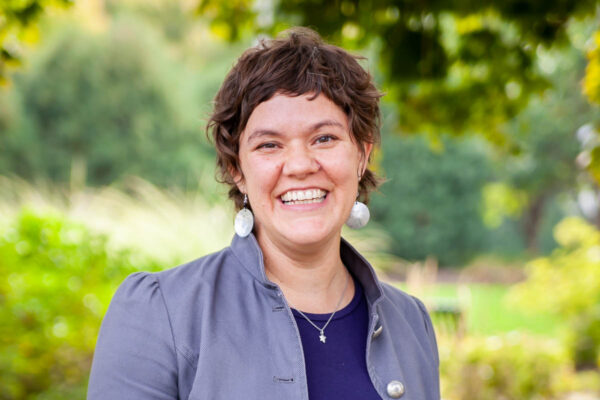Within worship

My daughter Maggie is two and attends preschool at St. Paul three days a week. Picking her up one day recently, I asked her teachers what some of her favorite activities are at school. To my surprise, they said she is loving art: painting, coloring, and clay-work, specifically. We had no idea! But we’ve since transformed our kitchen into a makeshift art studio. Paints are often out by 7:30 a.m. (with luck, onto the paper, not the floor). By 9 the smell of play-doh fills the air. Sometime in the afternoon we color. During these sessions Maggie pushes me to believe that I can put something on the page, that I can connect with her and with the beauty of creation in a meaningful way through art, something that doesn’t come easy to me.
This early November the eighth-grade confirmation students participated in what we call a Pathways Retreat. This retreat gives our students the chance to experience all of the different ways that God connects with us. We name seven such pathways, but there must be more: art, nature, traditions, relationships, contemplation, activism, and study. I’m sure some of the students felt about as confident painting mugs as I do with watercolors, but everyone gave it their best. That was wonderful to see.
One of my favorite things about this retreat is that we emphasize that “worship” is not one of these seven pathways, but instead incorporates all of them. For God has given all of us different gifts, and without any one of them worship wouldn’t be complete. The apostle Paul talks about this in 1 Corinthians, naming some of the different ways we experience God through different spiritual gifts. What’s interesting, though, is that these different gifts are never just for our benefit, or something we use alone. Rather, together we build one another up in the body when we come together to worship. This may seem obvious. But I for one don’t always think of spiritual gifts in the context of worship rather than say, service to others in the community. Yet worship, Paul says, is the primary home of these spiritual gifts. And their purpose or goal? Love. Indeed, that often-quoted love poem that begins “Love is patient, love is kind,” (1 Corinthians 13) is primarily neither about marriage nor even about the love of God in some abstract way. Rather, in context Paul means to say that one of the primary ways we use our spiritual gifts is in love to one another within worship. Next time you hear someone sharing their voice next to you in song, or offering a prayer from the front, or making a joyful noise on some instrument or another, notice God’s love flowing through them to build all of us up. For God constantly finds ways to make abundant love known through all sorts of people whenever we gather. May we share our gifts, share in that love, and have all our faith strengthened.




